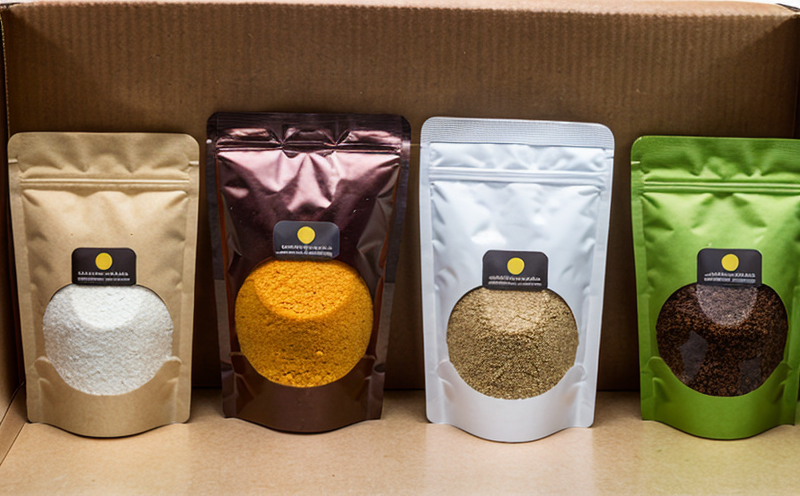EcoLabel Certification Testing of Food Packaging
In today’s consumer-driven market, ensuring that food packaging not only meets regulatory standards but also aligns with environmental sustainability expectations is paramount. EcoLabel certification testing plays a crucial role in this regard by validating the environmental credentials of food contact materials and packaging. This service ensures that products meet stringent eco-label criteria, thereby enhancing brand reputation and consumer trust.
Eco-labeling systems are designed to provide consumers with clear information about the environmental impact of their purchases. For food packaging, this involves assessing various aspects such as material composition, energy efficiency during manufacturing processes, recyclability, and biodegradability. The testing process is comprehensive and requires a deep understanding of both regulatory frameworks and sustainability benchmarks.
Our laboratory specializes in providing EcoLabel certification testing services for food packaging materials. This includes conducting rigorous tests on the chemical content, mechanical properties, and environmental impact factors. Our team of experts uses advanced analytical equipment to ensure precise results that comply with international standards such as ISO 14025, ASTM D6973, and EN 13432.
The importance of EcoLabel certification cannot be overstated in the current landscape where consumers are increasingly concerned about environmental issues. By obtaining this certification, companies can differentiate themselves from competitors by demonstrating a commitment to sustainability. Moreover, it opens up new market opportunities, particularly in regions with strong eco-labeling requirements like Europe and North America.
To achieve EcoLabel certification, food packaging must undergo several key tests:
- Material composition analysis
- Eco-footprint assessment
- Recycling rate evaluation
- Biodegradability testing
We ensure that every step of the testing process is conducted with utmost accuracy and reliability. Our state-of-the-art facilities and experienced technicians guarantee that you receive reliable data that can be used to support your eco-label claims.
By choosing our EcoLabel certification testing service, you not only meet regulatory requirements but also enhance your product’s marketability. It serves as a powerful tool for communicating your company's dedication to environmental responsibility, which is increasingly important in today's environmentally conscious society.
Applied Standards
| Standard | Description |
|---|---|
| ISO 14025 | International standard for environmental labeling and declaration |
| ASTM D6973 | Standard practice for determining biodegradability in composting environments |
| EN 13432 | European harmonized standard for the compostable packaging |
The applied standards ensure that our testing procedures are consistent and reliable. These international standards provide a framework within which we can conduct thorough evaluations of food contact materials and packaging to determine their compliance with eco-label requirements.
ISO 14025 sets the guidelines for environmental labeling, which includes clear communication about the environmental impact throughout the lifecycle of the product. ASTM D6973 focuses on biodegradability in composting environments, ensuring that the materials will break down safely and effectively under controlled conditions. EN 13432 specifies the criteria for packaging to be considered compostable, taking into account factors such as soil degradation time and chemical composition.
By adhering strictly to these standards, we ensure that our testing results are accurate and credible. This allows us to provide you with reliable data that can support your EcoLabel certification claims confidently.
Scope and Methodology
| Aspect | Description |
|---|---|
| Sample Preparation | Materials are thoroughly cleaned before testing to remove any external contaminants. |
| Test Parameters | Includes biodegradation, chemical analysis, and mechanical property assessment. |
| Instrumentation | Uses advanced analytical equipment such as Fourier Transform Infrared Spectroscopy (FTIR) and Gas Chromatography-Mass Spectrometry (GC-MS). |
| Data Analysis | Statistical methods are employed to ensure accurate interpretation of results. |
The scope and methodology for our EcoLabel certification testing service encompass a wide range of parameters that must be evaluated meticulously. The initial step involves thorough sample preparation, ensuring all materials are clean and uncontaminated before undergoing any tests.
Once prepared, the samples undergo various test parameters tailored to assess different aspects of their environmental impact. These include biodegradation studies in controlled composting conditions, comprehensive chemical analyses using FTIR and GC-MS, and mechanical property assessments to evaluate strength and durability.
The instrumentation used for these tests is top-of-the-line, ensuring high precision and reliability. Our laboratory houses advanced analytical equipment such as FTIR spectrometers and GC-MS systems which provide detailed insights into the chemical composition of the materials being tested. Additionally, we use specialized composting chambers to conduct biodegradation experiments under simulated environmental conditions.
Data analysis is carried out using robust statistical methods that help in interpreting complex data sets accurately. This ensures that all findings are presented clearly and comprehensively so you can make informed decisions regarding your eco-label certification strategy.
Why Choose This Test
Earning EcoLabel certification for food packaging is essential for several reasons, ranging from regulatory compliance to enhancing brand reputation. Regulatory bodies around the world are increasingly enforcing stringent regulations on the environmental performance of products, especially those in direct contact with food items. Obtaining this certification helps companies stay ahead of these changes and avoid potential fines or recalls.
From a marketing perspective, EcoLabel certification can significantly boost your product’s appeal to environmentally conscious consumers. Studies have shown that customers are more likely to purchase brands that demonstrate a commitment to sustainability. This not only improves sales but also fosters long-term customer loyalty.
Beyond compliance and marketing benefits, EcoLabel certification also offers significant operational advantages. It encourages innovation in material selection and production processes, leading to more sustainable practices across the supply chain. Companies that implement these changes often see improvements in resource efficiency and waste reduction.
Moreover, having this certification can open up new market opportunities by gaining access to regions with stringent eco-labeling requirements. Many countries have implemented policies favoring products with recognized eco-labels, making it easier for certified companies to expand into these markets.
In summary, EcoLabel certification testing of food packaging is not just a compliance requirement; it’s an opportunity to demonstrate leadership in sustainability and drive positive change within the industry. By choosing this service, you contribute towards creating a more sustainable future while also reaping numerous business benefits.





